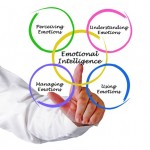 As we enter a period of seemingly ever increasing change, skills like resilience and emotional intelligence are likely to be ever more important. The attraction of emotional intelligence was highlighted by a recent study from the Universities of Geneva (UNIGE) and Berne (UNIBE), where the researchers illustrate the test they have devised to measure how emotionally competent someone is.
As we enter a period of seemingly ever increasing change, skills like resilience and emotional intelligence are likely to be ever more important. The attraction of emotional intelligence was highlighted by a recent study from the Universities of Geneva (UNIGE) and Berne (UNIBE), where the researchers illustrate the test they have devised to measure how emotionally competent someone is.
The test, which is known as the Geneva Emotional Competence Test (GECO), aims to provide a reliable measure for gauging someone’s emotional intelligence in a work context. The tool consists of four distinct tests, each of which aims to evaluate different parts of emotional intelligence, including understanding and recognising emotions, and regulating both your own and other people’s emotions.
“The GECO results were controlled and validated by additional tests, and they are very convincing,” the researchers explain. “The more emotional intelligence skills you have and the better those skills are, the better your work outcomes are, above and beyond your cognitive intelligence or personality.”
The importance of emotional intelligence
As part of the work into the tool, the team explored the power of emotional intelligence over our work, and found that the ability to regulate our emotions appeared to provide a boost to our income. EQ was found to be closely tied to skills such as empathy and openness to others, as well having a positive temperament and respect for moral rules.
GECO was tested on a range of people aged between 20 and 60, with the data suggesting that EQ is something that tends to increase with age, but that women tend to possess it more than men, especially in terms of nonverbal emotional intelligence. Perhaps unsurprisingly, it is linked with high leadership skills, which the team believe explains why it is proving so popular in recruitment scenarios.
The questions that form the GECO were compiled as a result of intensive interviews with around 40 managers at Swiss-based firms. The interviews required the managers to answer questions on various situations where they were faced with emotionally challenging scenarios. The answers were then validated by experts, before being tested on around 1,000 individuals.
The tool is currently available for academic and commercial use, and it will be interesting to monitor the takeup of the tool, and whether it is indeed used in recruitment and other HR-based scenarios.